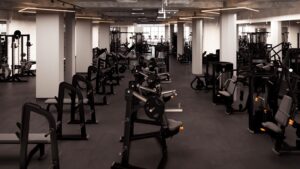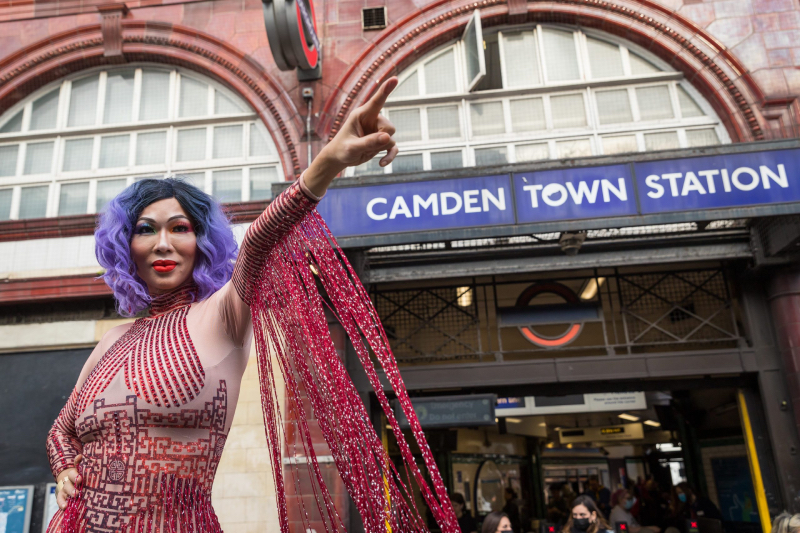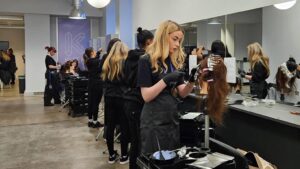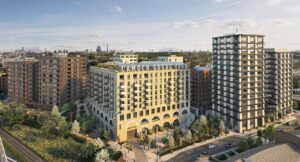
The Basement Gym + Studio opens in Camden Town
Camdenist readers get 50% off their first month’s membership, too

To realise just how important LGBTQ+ venues are to Camden’s life and culture – before any more are lost
A small group of campaigners stand outside an abandoned pub in the rain. Some don rainbow face masks, some are handing out leaflets and others are huddled under an umbrella protecting their hand-painted signs – ‘Hands off our queer spaces!’ – from the wet.
The group have been coming here every week for the past seven years to call for the reopening of iconic LGBTQ+ pub The Black Cap, which closed abruptly in April 2015. The venue had previously been open for over 50 years and was considered an epicentre of queer culture in Camden and beyond.
Fondly dubbed ‘the Palladium of Drag’, The Black Cap’s sudden closure sent shockwaves through the nightlife world, but sadly this loss is not unique. A study by UCL back in 2016 revealed that the number of LGBTQ+ spaces throughout London had declined by 58% in the previous decade. In Camden alone, the figure was 43%, amounting to six much-loved queer spaces lost since 2006.
A variety of causes have been blamed for the closures, from rising business rates to pressure for more housing, but these challenges are not constrained to queer spaces alone. In Camden, it’s an ongoing complaint: developers are attracted to the area’s rich cultural capital and buy out community spaces for profitable new apartments. Over time this raises the value of the surrounding area and prices out smaller venues, depleting the character and charm that attracted so many to the area in the first place.
But for the LGBTQ+ community, these dedicated cultural spaces hold a particular significance; they act as a haven of safety and acceptance that cannot always be found elsewhere, and protect a culture that is still distinct from the mainstream. Lazare Lazaro, a former regular at The Black Cap and prominent campaigner for its reopening, describes what the pub meant to him: “I found a kind of home” he explains. “I managed to secure myself some friends. When I went there I felt safe, which unfortunately even in 2022 as a gay man in London isn’t always the case”.
“I’m not a person who parties a lot, but to me it felt more like a community than a nightclub” Lazare continues. “It was a place for different kinds of people”.
The strength of feeling that resonates through the ongoing #SaveTheBlackCap campaign is palpable. Each week, the Black Cap Foundation hold a community hub, allowing queer people to gather together for tasks as simple as haircuts, painting and personal errands, or as pertinent as discussions about political issues affecting them. These meetings continued over Zoom throughout the pandemic. At their weekly vigils outside the boarded-up venue they sometimes host “Sing Outs”, a joyful street performance of cabaret and dancing that aims to replicate and celebrate the atmosphere that was once found inside.
“We’re not just campaigning” says Alex Green, a cabaret performer and member of the Foundation. “It’s colourful, it’s fun. In a way that little golden circle just outside the pub has been the only LGBTQ+ space left in Camden Town for years.” For Camden’s queer population, this defiant togetherness represents a direct rejection of the isolation so often ascribed to the LGBTQ+ community, with many still closeted, cast out from family members, or unable to fully reveal their identities publicly.

It’s a story of determination rather than defeat, and after two years of lockdowns that could have prized this community apart, Camden has instead seen signs of a shift in the pattern of closures from previous decades. Back in November, new trans-owned gay bar, Zodiac, opened the doors to its first permanent venture. Founder Jade, AQA Lady Phoenix [pictured], described the feeling of getting her license application approved to open in Euston after banding together over ninety letters of support. “People said I was brave for doing this, but I can’t thank the queer community enough for all their support,” she says. “It’s been hard work but it’s worth it.” Much like the Black Cap campaigners, she highlighted the necessity of queer togetherness as an antidote to queer isolation: “I felt so lonely in London and now we have a family.”
The 250-capacity bar on Hampstead Road is a glimmer of hope after over a decade of challenges, its massive success since launch showing that the closures of so many gay bars have not been for lack of demand. “Our visitors, gay, trans, everything just keep telling me ‘thank you!’ They are so grateful for a new space to go,” says Jade.
In the case of The Black Cap, early whispers of a revival came in October when campaigners were allowed to go inside the venue for the first time since its closure to survey the building’s current state, after it changed hands to a new owner. “It was just this mad moment, being offered the opportunity to actually go in” says Alex Green. The building itself was found to be in much better condition than feared, marking the beginning of what Alex calls “promising progress” in the battle to get it restored. “I think it’s exciting if we combine where we are with what’s happening with Zodiac.”
The campaigning group are now in early talks with a successful LGBT operator and potential buyers of the freehold and are being supported by Camden Council. “We’re spearheading Camden’s resurgence and hoping to welcome new LGBT businesses and people in”, adds Alex.
Tessa Havers-Strong, director of forum+, an LGBTQ+ charity in the borough, also remains hopeful about the future of gay culture in Camden: “forum+ was very proud that our application for the nomination of The Black Cap as an Asset of Community Value (ACV) was successful in April 2020 – recognition of the special place this iconic venue holds in Camden culture and heritage,” she tells us. “Camden’s long history of LGBTQ+ activism, community and culture is still alive.”
Such steps forward are a deserved relief, but the long ordeal to get here has not been a means to an end. On the contrary, the community that has been built in the face of hardship is a heartening portrayal of queer solidarity in itself, and a demonstration of how LGBTQ+ spaces could look in the future. K Anderson, host of the podcast Lost Spaces, described how he thinks gay bars of the future might evolve: “I think that one of the big reasons [for closures] is that the scene hasn’t always adapted to the new needs and views of its customers. People aren’t drinking as much anymore, and if you want to go out without alcohol there are very few queer-friendly spaces you can go.”
Initiatives like The Black Cap community hub– with its focus as much on gathering for mundane daily activities as extravagant, lively nights– are perhaps a glimpse into a culture that could become widespread in more gay bars. “What I’m hoping we’ll start to see more of, once we’ve figured out how to live alongside Coronavirus, is the opening of more queer spaces that are multi-functional and community hubs,” K Anderson says.
Zack Polanski, Green Party London Assembly Member and one of the founders of the Black Cap Foundation, concurs: “I think it’s vitally important that we protect the spaces we do have – and whilst I absolutely welcome new ventures and ideas, I do still think there’s a massively important cultural history in The Black Cap that’s part of our LGBTQ+ London narrative.”
The arrival of Zodiac and a revival of The Black Cap mark the beginning of a resurgence of queer nightlife in the borough. Equally though, Camden’s queer population have harnessed a determination and enduring togetherness in the loss of their spaces that encapsulates the essence of what queer spaces are for in the first place. “People say that it’s been six years and that nothing is going to happen,” says Lazare, “but it is happening! We are still here, fighting the good fight.”
This article first appeared in the latest Camdenist Presents…The Night magazine, available now across Camden, Central and East London venues.

Camdenist readers get 50% off their first month’s membership, too

A brand new hairdressing and barbering academy has landed in Camden Town and is now seeking style-conscious models and enthusiastic trainees

We speak to founder, Sol, about bringing the studio to Kentish Town

Explore the neighbourhood’s brand new neighbourhood